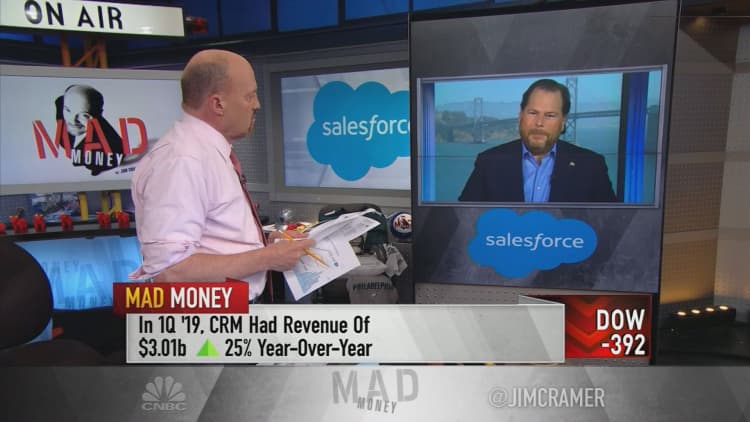On Tuesday night, Salesforce promoted Keith Block to be its co-CEO alongside co-founder Marc Benioff.
Block joined the company in late 2013 from Oracle, and under his tenure the company has approximately tripled its revenue and taken its stock price up about 250 percent. He's been the quieter behind-the-scenes leader, leaving Benioff to take public stands on social issues and poke at rivals. But insiders have given Block credit for whipping the company's sales initiatives into place, including a stronger focus on vertical markets.
The two men's roles will stay more or less the same as they are today: Block will lead "growth strategy, execution and operations," while Benioff will oversee "vision and innovation in areas including technology, marketing, stakeholder engagement and culture," according to the company's announcement.
So why the title change? In an interview from the company's annual management meeting in Hawaii, Block told CNBC that it was really about formalizing the relationship between the two as the company continues to grow fast and expand internationally.
"It is a company that is scaling like no other," Block said. "We're the fastest [software company] to $10 billion [in annual revenue], we're the fastest to $20 billion, and we're a global company now. This really is a natural extension of the relationship Marc and I have had over the last five years. He is a trusted advisor of mine, I am a trusted advisor of his."
International expansion is one of three growth areas, said Block. The other two are continuing to develop and improve vertical solutions for particular industries — "speaking the language of the customer has always been very very important" — and tighter work with the company's partners, which include both systems integrators (independent companies who stitch Salesforce services into broader solutions for enterprises) and software developers building products on top of Salesforce.
"All the top six systems integrators run their businesses on Salesforce, their fastest growing practices are Salesforce, they're really a natural extension of our company," Block said. Also important are independent software vendors, which are "betting their business by building products and solutions for customers on top of our platform."
Block did not say whether Salesforce will continue to do big acquisitions, like its $6.5 billion purchase of MuleSoft earlier this year, but said that the company's growth strategy is both "organic and inorganic" and that its M&A strategy is "very well thought-out, very strategic."
"At the end of the day, we do these [deals] because we listen to our customers and our customers drive our strategy," he said.
In other words, as long as customers are pointing out gaps in Salesforce's portfolio, the company will continue to fill those holes through internal development or with acquisitions.
Salesforce is expected to report earnings for its fiscal second quarter on August 29. The stock rose 0.7 percent on Wednesday.



